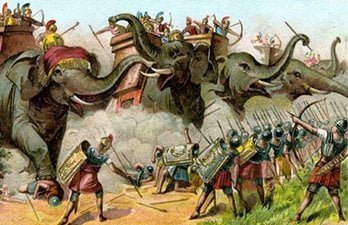
You see it was the Pyrrhic Wars that led to the term “Pyrrhic victory”.
These were wars fought by Pyrrhus, the King of Epirus. He was king of the Greek tribe, Molossians, from the royal house of Aeacid, later he became King of Epirus.
In fact, he was one of the strongest opponents of early Rome Empire. To explain, this was when Rome was developing into a great empire. King Pyrrhus wanted to stop that expansion, which led him to fight Rome in what was known as “The Pyrrhic War”.
He was a skilled commander, who had a strong army fortified by elephants. As the Romans had never faced elephants before King Pyrrhic initially scored several costly victories at Heraclea and Asculum, he even took Sicily from Carthage, against the Roman legions, unfortunately, while he achieved these victories he suffered colossal losses.
In fact, it is said that after one of his battles he was heard to say, “If we are victorious in one more battle with the Romans, we shall be utterly ruined.”
You see, in the battles he lost so many men that there were no more he could call up from home and his allies were becoming unhappy at the losses so stopped providing them. The Romans, on the other hand, had at their disposal immense military manpower, so each time they needed to replenish their forces, they could, even when they were depleted in multiple battles.
This is where the term Pyrrhic victory came from, it referred to a victory that inflicts so many losses that in the long term the victor cannot afford to win.
So, a Pyrrhic victory is where while winning the victor inflicts such shattering damage on themselves that the victory is tantamount to defeat, as what happened to King Pyrrhic
Isn’t history interesting?
10 questions to discuss:
- Who was Pyrrhus, and what was his claim to fame?
- Why did Pyrrhus fight against the Roman Empire, and what were his initial aims?
- How did Pyrrhus’ elephants contribute to his early victories against the Romans?
- What is the historical significance of the battles of Heraclea and Asculum in the Pyrrhic Wars?
- Explain the meaning of the quote attributed to Pyrrhus after one of his victories. Why is it significant?
- How did the differing resource capacities of Pyrrhus and Rome ultimately influence the outcome of the war?
- Define the term “Pyrrhic victory” in your own words, and connect it to the specific events of the Pyrrhic Wars.
- Can you think of any other historical examples of Pyrrhic victories, either in military campaigns or other contexts?
- What lessons can be learned from the story of Pyrrhus and the Pyrrhic Wars, particularly regarding the costs and consequences of victory?
- In today’s world, do you think the concept of a Pyrrhic victory is still relevant? Why or why not?
These questions go beyond simply recalling facts and encourage analysis, interpretation, and discussion about the broader themes and applications of the historical event.
To find out where Epirus was go to:
For more on Pyrrhic victories go to:
© Tony Dalton

